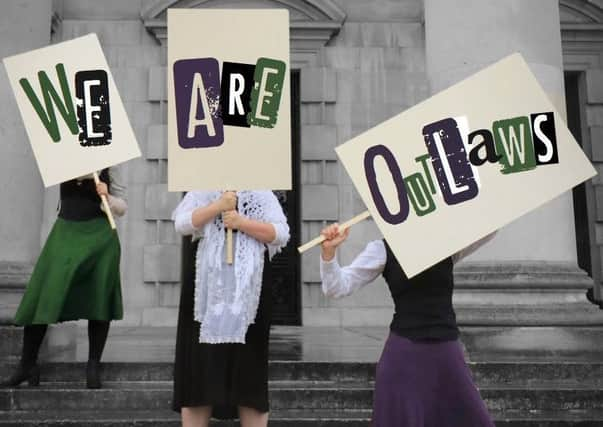Story of the Suffragettes in Leeds


This year has seen a number of creative responses to the centenary celebrations of some women getting the vote in 1918 but few have put the audience right at the centre of the action.
Next week an exciting new production at Leeds Civic Hall will be doing just that. We Are Outlaws tells the story of the extraordinary Leeds women who made their mark in the campaign for women’s suffrage and it seems fitting that the production is the brainchild of an all-female creative team.
Advertisement
Hide AdAdvertisement
Hide AdDirector Olivia Race and producer Alice Barber, who both also appear in the play, run Front Room Productions and have collaborated on the script with Elvi Piper, artistic director of Wrongsemble. Race and Barber are well-versed in making theatre in unconventional spaces – previous shows have taken place in bedrooms, on farms and in markets – and We Are Outlaws will be an immersive promenade experience with live music.
The cast of six professional actors is supported by a community cast of 19 who will lead the audience around the Civic Hall to witness meetings, demonstrations and marches inspired by actual events that took place in Leeds in the early 20th century. “It is our largest-scale work so far,” says Race. “And we are really pleased to be telling this regional story.”
The suffragette movement has significant links with the North – the Pankhurst family had strong ties to Manchester – but relatively little is known about the many other women involved in the struggle and Race and Barber, along with Piper who co-directs, wanted to rectify that. They were also keen to represent the radical nature of the women involved, hence the title. They were effectively ‘outlaws’ – many of the women were imprisoned multiple times – and they were not afraid of direct action. “They never harmed people but they were quite prepared to harm property,” says Race. “Some might say they were terrorists but they were fighting for a democratic right.” The central figure in the piece is Leonora Cohen, a respectable middle-class woman from humble beginnings in Leeds. A member of the Women’s Social and Political Union (WSPU), the militant wing of the women’s suffrage movement formed by Emmeline Pankhurst in 1903, Cohen gained notoriety when in 1913 she went to the Jewel House at the Tower of London and threw an iron bar at one of the display cases. “We have formed the narrative around her court case because she represented herself,” says Race. “Then the stories of other women are brought in to highlight certain parts of her story.” Those who feature include Mary Gawthorpe, a teacher who became a full-time organiser for the WSPU, Jennie Baines, the first suffragette to be tried by jury due to her involvment in an ‘unlawful assembly’ in Leeds and Charlotte Marsh one of the first women to be force fed during one of several terms of imprisonment for militant protest. “Part of what we wanted to achieve is a bit of a call to action,” says Race. “We have an epilogue that covers what has happened over the past 100 years but also touches on how much more still needs to be done. It feels like an important thing to be saying right now.”
At Leeds Civic Hall, December 14, 6pm and 8pm.